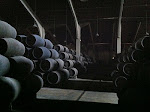Deep Thoughts on Deliciousness
 The other day I was reading an excellent article in the current issue of The World of Fine Wine, an article that makes the case for Beaujolais as a "fine wine," the same way we think about Burgundy or Barolo, for example. I cannot link directly to the article, as The World of Fine Wine doesn't publish content online, but you should subscribe anyway. Like The Art of Eating, this is a must-have. Some of the very finest wine thinkers write for WOFW - this Beaujolais piece, for example, is by Peter Liem.
The other day I was reading an excellent article in the current issue of The World of Fine Wine, an article that makes the case for Beaujolais as a "fine wine," the same way we think about Burgundy or Barolo, for example. I cannot link directly to the article, as The World of Fine Wine doesn't publish content online, but you should subscribe anyway. Like The Art of Eating, this is a must-have. Some of the very finest wine thinkers write for WOFW - this Beaujolais piece, for example, is by Peter Liem.
It is a well considered and thoughtful article. Instead of merely talking about how great Beaujolais is, it establishes a simple framework for thinking about "fine wine," and then looks at whether or not Beaujolais meets some or all of the criteria. There are many interesting ideas in the article, but one in particular stuck with me, and for me it's less about Beaujolais than about evaluating wine in general. Here is the quote:
The expression of terroir demonstrates the intellectual side of cru Beaujolais, but another element that is often ignored, particularly in an environment driven by professional blind tastings and numeric scoring, is sheer drinkability: the capacity of a wine to compel us to keep returning to it over and over again. Somewhere along the line, the notion of deliciousness seems to have become, if not pejorative, then at least frivolous—as though we should feel guilty for delighting in a wine’s visceral pleasures.Interesting, right?
There are many directions one could go with this idea. It makes me think of how I tend to undervalue wines if they are inexpensive, even if like Muscadet for example, I love the wines. Or the amazing and substantial $16 bottle of Ott Gruner Veltliner I recently had - why didn't I load up on that wine? I ran out and bought some $40 Hirsch Riesling after tasting those wines, why not the cheaper wine that offered little other than deliciousness? It makes me think about how complexity implies quality, and although I enjoy complexity, why does the degree of complexity correlate with the way we experience quality? It makes me think about a lot of things.
Care to share your thoughts?







19 comments:
I like Beaujolais.
Thank you for the magazine tip. I wish I could afford it.
Peter Liem, as always, makes a good point well said. I drink a lot of delicious wine.
I think the ability to talk about the different components of a wine leads to significant enjoyment. In fact, I might argue that the talking about its specific characteristics with someone else who also enjoys wine, is more fun than the specific act of drinking the wine. The same way that talking about a movie with someone who shared the experience is often more fun than the movie, per se. It's not to say that complexity = quality or that deliciousness doesn't = quality, but a product that offers characteristics other than the superficial suggests more time and effort went into its production. This is what signifies quality to me, the attention to detail, the time, customization, dedication. If the wine is delicious, great, but if that's the end of it, so what? Anyway, who said that deliciousness and complexity are mutually exclusive?
Wine appreciation shares many characteristics with art appreciation in that the terms of appreciation have been set in such a way as to qualify the subject matter. In other words, we must deem something worthy of being called art/fine wine prior to appreciating it as such.
To follow the analogy, this, it seems to me, would position wine appreciation in it's post-modern stage. As modernization of wine making has abstracted the product into something achievable globally as a specific qualified type, there are those of us who are turning the assessment on it's ear and questioning the qualify standards of qualification themselves. (as Rauschenberg taught us, if you abstract the process far enough, everything will be the same.)
However, it doesn't mean that all the modernized wines are bad either, which becomes the knee-jerk reaction. It seems fitting to me that the reconciliation of the overlap would be found (if it is to be found) in Beaujulais. It certainly won't be with Muscadet, or Loire reds, or Jura, etc. despite all of those being delicious wines as well.
Couldn't agree more. I selected a Sebach-Oster dry riesling for $15 for tonights wine with wife and it is so pretty and delicious. It was next to some of his other high end offerings but I can't find a flaw right now with my choice.
I think this has something to do with whether a wine goes well with food. Wines that win prizes at wine tastings seldom go well with food. Wines that go well with food play a supporting roll, but can be delicious just the same.
So the challenge is: why use the language of "fine wine", or of "terroir" for that matter, if the criteria for judging a wine devolves to taste? I mean, it's your picture show, right? Peter pushes this farther with the idea of "compel" - compulsion could come from multiple sources, including the wine itself but also anticipation, mood, friends, state of mind... To pick only one of those sources, like eating a good meal (which is what I think we mean by "food friendliness"), seems pretty arbitrary. I guess the bigger question for me is - what good are categories like "Beaujolais" or "natural wine", for instance, as your criteria for a fine wine when the real basis for judgment is autobiographical?
Still not sold on Cru Beaujolais, I thikn its good but not "OMG fantsatic"
Muscadet I find Fantastic like drinking a good Champagne [minus the bubbles]
Our wine club sampled 5 Cru Beaujolais wines the other night--and though all members have incredibly different palates, we all enjoyed the wines. With varying levels of complexity they were all super drinkable, delicious, and easy to pair with food! And at least 4 of the bottles were under $25.
The tasting notes appear in poetic form on ImbibeNewYork.com
Cheers!
In think perfection in wine is when complexity and deliciousness meet. I can enjoy either component, but a wine really sticks with me when both elements are there.
I have to agree with Wine of the Month Club, in a slightly different way. As a film student in college and wine professional now, I always found an interesting parallel between the question about my favorites in either category. I never have found it very easy, or even possible, to pick one favorite film or one favorite wine.
My answer to people who ask me those questions, if they have time to listen, goes like this. First off, everyone is different, and if someone tells you that your favorite anything is wrong, move on and don't talk to them about such things. Secondly, to use the wine side of things, my favorite wines are those that can be loved by the connoisseur and the wine novice. That is, the are delicious on the surface, or in superficial terms (I don't like calling people's taste superficial, or chalking up "delicious" as akin to superficiality, but that gauntlet has been laid here already) easy to enjoy, but also have layers of complexity and a great backstory for those of us that want to think about that kind of thing. As far as cru Beaujolais, I would challenge most people who claim they can't be fine wines to blind taste them with a group of Burgundies and tell me why the Beaujolais are lacking...I just don't think it's true.
@BrooklynGuy great post and great quote from Peter. One thing I would add: context.
The other day, a man (whom you've met) poured me a super oaky California buttery Chardonnay with 14% alcohol. The man works in a taco shack and he wanted to buy me a glass of wine in honor of our upcoming wedding. Buttery, okay Chardonnay never tasted so good (for all the reasons that you well know!).
Sometimes a wine can be "delicious" merely because of the people with whom and the occasion for which you share it, no?
Great post...
Deliciousness in wine is not only subjective, but also
elusive and fleeting. I don't see complexity as being at odds with deliciousness but as complementary. To introduce quality into it brings all the hierarchies, marketing, status, prestige aspects of wine, which I think become a distraction.
It's tricky to separate quality from deliciousness but I think it helps to eliminate things like price and status from acting as distractions. Wine marketing in America has managed to diminish deliciousness in favor of other things that made wine into the thing that costs a lot and intimidates people and all that stuff epitomized by the $100 Napa Cab.
With all this in mind wouldn't make sense to rate wines simply on their deliciousness?
For many years, whenever someone would ask me what my favorite films were, I would give them a list of movies that I thought should constitute a list of fine films. I really liked those films, and thought they were great, but at some point I realized that most of those movies I had only seen a few times, whereas there were other movies had I seen 10 or 20 times that never made the list. Since that time, my list has changed. “Raising Arizona” is now shamelessly listed next to Kurosawa’s “Seven Samurai”. They are both truly “fine” in their own ways.
Thank you for your comments, and thanks to brooklynguy for this post. I don't know how many of you have read the article, but I think that it's important to consider this quote in the larger context of the piece. I was not arguing that wines should be rated based on their deliciousness, nor that a critical assessment of wine should be purely autobiographical. In fact, I have always argued against these things—for me, a wine has no intrinsic worth if it doesn't say something about where it came from, no matter how good it might taste. And I certainly take a dim view of wine reviews that emphasize how delicious a wine is if the author doesn't simultaneously demonstrate a knowledge and understanding of the wine's greater context. My point about the deliciousness of Beaujolais was actually that it combines both intellectual and visceral pleasure in a particularly joyful and exuberant way, and I speculated that this pure, almost-too-easy drinkability has played a role in Beaujolais not being taken seriously as a "fine wine". And yes, you can argue about what this term can mean—I like Timothy's ideas about the postmodernism of wine appreciation.
Great article and something I’ve thought about a bit myself.
It would seem to me that “deliciousness” is a purely sensory, carnal, experience – seeing, smelling, tasting, hearing (think sparkling), touching (maybe a stretch, but a nice Riedel glass can change your experience). All of this is individual, as our minds process the various stimuli and try to make sense of them … do I want another sip or do I want to vomit? Also, it is significantly influenced by context - the surroundings and attitude of the taster.
The question of “fine wine” introduces a completely new element to the mix – logic/rationale. The idea of assessing the quality of wine or its merits outside of your own personal preferences is distinctly separate from its subjective enjoyment. It is also critical to selling wine because most people want to know what to expect for the money they shell out.
Usually, logic comes first and influences the sensory experience – i.e. your mouth starts to water at the sight of an expensive bottle of Margaux. At least for me, the most enjoyable experiences have been when there is a disconnect between the two. Blind tasting can reveal delicious surprises by keeping our expectations in the dark. Or, in the case of Peter’s lovely Beaujolais, you drink a wine that is so delicious you try to rationalize why it’s not commonly acknowledged as a fine wine.
I tend to see this in analogy to economic terms. Wines with youthful complexity and a 'delicious factor' are not all that rare, though they do require skill and great fruit to produce. Wines that are both delicious and intellectual, especially those with structure and age, are simply rarer. There's attrition in the form of drinking too young, bottle variation and oxidation. A structured or perfectly aged wine may be no more delicious than a youthful yet complex wine with approachable structure. But the comparative rarity of experiences with the former drives up its perceived value. Is one intrinsically better than the other? I'd say no. But the rarer, more costly wine is given higher title usually.
Thanks for all of these thoughtful comments, I enjoyed reading and thinking about them.
One thing - I didn't explain myself well in the post, when talking about one aspect of 'deliciousness.' One thing I meant to ask is this: does the relative value of deliciousness change with the price of the wine? In other words, is a $15 wine a great wine if it is delicious, and not terribly complex? A $40 wine isn't, but maybe a $15 wine is? Perhaps price is unimportant, and great wines need to be delicious and also reflective of something in order to engage us intellectually.
I think that complexity is a different issue. Complexity really has nothing to do with deliciousness—I think that Pepière's entry-level Muscadet is delicious, and I also think that Romanée-Conti is delicious. I do think that complexity is a desirable trait in a wine, and certainly if you're paying a lot of money for a bottle (whatever a lot of money means to you) then it's reasonable to expect a certain level of complexity. But a wine can be satisfyingly expressive of place without necessarily being very complex, and I find value in that. On the other hand, a wine that is simply delicious, without expressing anything else, doesn't interest me, no matter how inexpensive it is.
Conversely, a wine can be highly expressive and interesting and have a great deal to say, and yet not be delicious at all. This is one of the reasons why, as has been pointed out, deliciousness has little place in wine criticism: whether a wine is delicious or not is generally a matter of preference rather than an indicator of quality. Sometimes I'll taste a wine and it hits all the right notes on a checklist and you can see that the winemaker was very clever and whatnot, and yet I'm completely uninterested in drinking it. It's like the Kenneth Noland of wine—I'll acknowledge Noland as a great colorist, and intellectually it's easy to see how his theories are all very clever, but I can't stand his target paintings. (In contrast, I find the targets of Jasper Johns to be profound in a way that Noland's could never be.) Which makes one think first about the basic function of wine, which is after all a beverage, no matter how grand, and second, how far the parallels between disciplines go: people often say that "wine is art", but if a great work of visual art can be potentially devoid of beauty (since beauty is, after all, in the eye of the beholder), can a wine be great and yet not delicious to drink?
Post a Comment